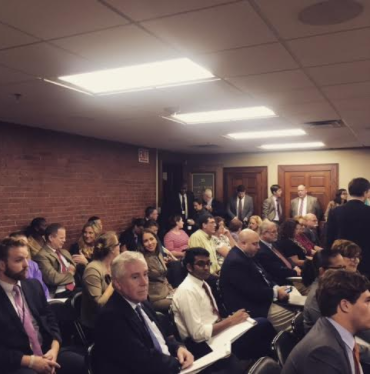RI Behind Revenue Projections — DiBiase on Sports Betting Shortfall and More
Friday, April 05, 2019
Director of the Department of Administration Michael DiBiase joined GoLocalProv's Kate Nagle on LIVE
DiBiase said he remains “cautiously optimistic” when he joined GoLocal News Editor on GoLocal LIVE at the Rhode Island State House that the “key months” of March and April will get the state where it needs to be, after last November the House fiscal adviser projected that the state was looking at a nearly $50 million shortfall for the current fiscal year — and a more than $110 million deficit during the next fiscal year.
The state’s dismal sports betting numbers for the current fiscal year are well off projections, as the state had originally budgeted revenue estimate at $23.5 million for the year before dropping that number to $11.5 after the later-than-expected launch.
GET THE LATEST BREAKING NEWS HERE -- SIGN UP FOR GOLOCAL FREE DAILY EBLASTNow, four months in, the state has only booked just over $300,000 in revenue, according to the most recent unaudited and unadjusted numbers from the state.
“I think first of all, it’s not a straight line — so they’re volatile over the course of the year. March is a big month because of March Madness,” said DiBiase of the sports betting numbers -- which saw the state lose nearly $900,000 in the month of February. “This is kind of unchartered water in terms of there’s not a lot of experience in other states so the assumptions were not based on a lot of data. But we remain optimistic that we’ll increase revenues over time.”
MORE BELOW VIDEO
DiBiase said that he expected the recent approval of mobile sports betting that the numbers will near where the estimates projected.
“We also expect to now have mobile online — we do anticipate adding that to the bottom line. I think in the current year we’re looking at $12 million and I think we have growth projected for next year overall because [not just] online betting but lottery revenue in general,” said DiBiase.
“With marijuana [legalization], unliked sports betting, we actually have better data and experience. I think the estimate is $6 million for next year so we feel really comfortable with those number,” said DiBiase.
When asked how things look heading into the May revenue estimating conference, DiBiase noted the state is currently behind -- but he is optimistic moving forward.
“We’re a bit behind right now in terms of revenues but the key months are March and April and I remain cautiously optimistic that we’ll pick up some ground,” said DiBiase
Injured on Duty Legislation, Efficiency Commission, Education Proposals
DiBiase spoke to testifying this week before the Senate Finance Committee to revamp the state’s injured-on-duty laws, pointing out that of the 24 state employees collecting injure-on-duty benefits, 18 are sheriffs.
“We’ve been fighting hard to support the Governor’s legislation to bring changes to a statute that actually doesn’t work. It creates the wrong incentives and causes a situation where we have many more people injured on duty,” said DiBiase. “The average is that they’ve been out for four years — this is supposed to be a temporary program.”
DiBiase also addressed the work of the Efficiency Commission, which was tasked by Governor Raimondo fo find $10 million in savings.
“We’re going to have our third meeting on Monday and we’ll finish up by April and come up with recommendation,” said DiBiase. “We’re confident we’ll get the [$10 million] savings mark. Half of those recommendations [are] related to real estate and the other half will be about program consolidation.”
Education proposals including universal pre-K — and the expansion of the state’s free college “RI Promise Program” from CCRI to RIC — will face tough political battles, according to DiBiase.
“The Governor is extremely passionate for [universal] pre-K for a good reason — they get a good start before kindergarten, which the Governor also championed full day,” said DiBiase. “The revenues are tight and we’re going to have to fight for that but I think there’s a lot of broad support.”
And while less than 40% of the first year Rhode Island Promise students met the threshold of GPA and class load at CCRI to qualify for free tuition through the program in the second year, DiBiase defended Raimondo’s proposal to expand the multi-million dollar taxpayer program to Rhode Island College.
“[What] the Governor’s talked about is the economics of what holds a lot of these students back — they’re going to work or they have to worry about money so if we can makes things easier and it’s not a lot of money in the scheme of things,” said DiBiase. “We’re not talking about a lot of money to make it possible for students to get a higher education.”
Related Slideshow: $11 Million Paid to Dead People and Other Key Findings of State Audit - April 4, 2019
Related Articles
- “Make Sure There Aren’t Big Corporate Monopolies” — Marijuana Legalization Advocate Kain on LIVE
- Raimondo Sets Forth Her Legacy as Governor — Free College and Legalized Marijuana
- Guest MINDSETTER™ Broadmeadow: Marijuana Debate & the History of Crime
- Raimondo’s Office Says Gov’s Husband Has “No” Interest in Any Marijuana Businesses
- Raimondo’s Budget: Taxes and Fees on Netflix, Beachgoers and Marijuana, Spending Jumps to $9.9B
- Raptakis: Tie RI Minimum Wage Increases to Consumer Price Index — Don’t Legalize Marijuana
- Health Experts Oppose Addition of Opioid Use Disorder to RI Medical Marijuana Program
- DBR Director Tanner Outlines Marijuana, Blockchain and Mimosa Regulations on LIVE
- RI Moving Fast to Expand Sports Betting and Legalize Marijuana—Is Prostitution Next?
- GOP and Senate President Ruggerio Spar Over Legality of Sports Betting in RI
- Delayed Sports Betting Could Cost Rhode Island Millions
- RI General Assembly Votes to Allow Mobile Sports Betting
- Marijuana Legal in MA, Sports Betting Going Live in RI — What You Need to Know
- Raimondo Signs Bill Allowing Mobile Sports Betting
- House GOP Seeks Supreme Court Advisory on Online Sports Betting
- Marijuana Race - MA is Not Very Far Ahead of RI
- Mobile Sports Betting, 3-D Printed Guns: This Week at the State House
- Mobile Sports Betting, Sales Tax for Online Retailers: This Week at the State House
- Nearly 2 Months Late, Millions Lost in Revenue to RI — Sports Betting Launches in RI on Monday
- UPDATED: Senate President Ruggerio Pushes for Mobile Sports Betting
- Gov. Baker Proposes to Legalize Sports Betting in MA, Big Hit to RI
- Legal Sports Report’s Gouker LIVE on Mobile Sports Betting in RI—and Competition from MA & CT
- New Study Finds 21% of MA Residents Used Marijuana in Last 30 Days
















